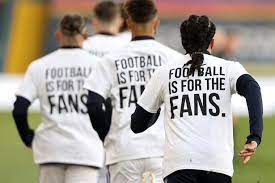By Andrew Warshaw
April 21 – It took months of secret behind the scenes negotiations to put together but disintegrated just 48 hours after its launch.
The European Super League, lambasted and derided for putting greed above all else, has dramatically collapsed after all six English clubs involved – half its founder members – collectively capitulated late Tuesday night having badly misjudged public opinion.
Arsenal, Chelsea, Liverpool, Manchester United, Manchester City and Tottenham abandoned the proposed elite closed competition amid a tsunami of condemnation and warnings their players could be banned from all established competitions, including the World Cup, and that they could be potentially thrown out of the Premier League.
Each of the six issued an individual statement as to why they were pulling out, not all of them totally convincing but nevertheless leaving the Super League in tatters in its attempt to undermine the Champions League and irrevocably change the footballing landscape.
The remaining clubs – AC Milan, Juventus and Inter Milan from Italy plus Spain’s Real Madrid, Barcelona and Atletico Madrid – blamed “pressure” being applied for forcing out the English and suggested their project was not completely dead.
Still insisting that “the current status quo of European football needs to change”, the Madrid-based league added: “Given the current circumstances, we shall reconsider the most appropriate steps to reshape the project, always having in mind our goals of offering fans the best experience possible while enhancing solidarity payments for the entire football community.”
Those words will sound distinctly hollow after the English clubs heeded appeals from UEFA President Aleksander Ceferin and FIFA boss Gianni Infantino to remain part of the Champions League and its qualification criteria or suffer the consequences.
“I said yesterday that it is admirable to admit a mistake and that these clubs made a big mistake,” said Ceferin who had launched a public and personal tirade against those involved ever since Sunday’s Super League announcement. “But they are back in the fold now and I know they have a lot to offer not just to our competitions but to the whole of the European game.
“The important thing now is that we move on, rebuild the unity that the game enjoyed before this and move forward together.”
Manchester City were the first to officially back out of the venture following a powerful statement by manager Pep Guardiola but even then it was felt that the clubs with American owners – Arsenal, Liverpool and Manchester United – might resist pulling out. Ultimately, all of them caved in.
“We have listened carefully to the reaction from our fans, the UK government and other key stakeholders,” said United though there will be little doubt in the eyes of most observers that they and the other five English clubs would have persued their elitist goals without such a fierce backlash. The Premier League had reportedly threatened the six renegades with expulsion after the other 14 clubs met Tuesday and “unanimously and vigorously” rejected the Super League plans.
Liverpool owner John W Henry put out a personal video message in which he said he wanted “to apologise to all the fans and supporters of Liverpool for the disruption I caused. We heard you. I heard you.”
Arsenal said they simply did “not want to be left behind. We made a mistake, and we apologise for it. We know it will take time to restore your faith in what we are trying to achieve.”
Tottenham, heavily in debt mainly because of their relatively new state-of-the-art stadium lying empty and dormant during the pandemic, also gave a detailed explanation for why it had staged a u-turn.
“We regret the anxiety and upset caused by the ESL proposal,” chairman Daniel Levy said. “We felt it was important that our club participated in the development of a possible new structure that sought to better ensure financial fair play and financial sustainability whilst delivering significantly increased support for the wider football pyramid.
Chelsea, owned by Russian billionaire Roman Abramovich, revealed it only joined the Super League group last week.
“We have now had time to consider the matter fully and have decided that our continued participation in these plans would not be in the best interests of the club, our supporters or the wider football community,” Chelsea said in a statement hours after its game against Brighton had been delayed by fan protests outside its Stamford Bridge stadium.
Inter Milan look likely to be the next to leave with the Italian news agency ANSA quoting a club source as saying “The Super League project in its current state is no longer considered of interest by Inter”.
Florentino Perez, the Real Madrid president and villain of the piece who masterminded the Super League, pulled out of an interview while Italian newspaper la Repubblica quoted former European Club Association chairman Andrea Agnelli, publicly labelled a “liar” by Ceferin (godfather to the Juventus chief’s daughter) for disguising his true intentions having pledged for months he wanted to work with UEFA, not against it, as saying the remaining clubs will “press ahead” and the project still had “a 100% chance of being a success”.
That now seems a forlorn hope. The bigger picture is how quickly trust can be restored between the 12 founding Super League clubs (there were supposedly three more imminent members whose identity we may never know), their fans and the wider community.
Contact the writer of this story at moc.l1746784992labto1746784992ofdlr1746784992owedi1746784992sni@w1746784992ahsra1746784992w.wer1746784992dna1746784992

